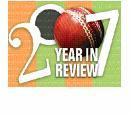Petrina Francis, Staff Reporter
The education sector in 2007 was marked by several changes, tragedies and challenges.
Violence rocked many institutions and scores of students who sat the Grade Six Achievement Test (GSAT) were placed in schools, which were not yet constructed.
In September, there was a change in government, resulting in a change in the minister of education. This also resulted in the abolition of tuition fees for students at the secondary level.
Ena Barclay, president of the Jamaica Teachers' Association (JTA) said 2007 was a challenging year for education.
"It was a year in which the education system grappled with the the ongoing issue of violence, and teachers continued to have challenges with resources," said Mrs. Barclay.
She added: "Teachers continue to grapple with the economy and how they fit in the economy."
Notwithstanding, Mrs. Barclays' concerns about 2007, Ruel Reid, special adviser to Minister of Education Andrew Holness, described 2007 as an excellent year for education.
"Overall, it was a good year for education. It was one of the sectors where there were incremental improvements," Mr. Reid told The Sunday Gleaner.
He said a new curriculum was developed for the early-childhood level and persons are now being trained to implement the new syllabus.
New and regularised system
Mr. Reid also pointed out that early-childhood institutions were, in November, given 90 days to become registered, paving the way for what he said is expected to be a new and regularised system.
He said there was also an improvement in the results for children who sat the Grade Four Literacy Test, noting that 79 per cent of them had attained the 'mastery' level.
The special adviser said there had also been an increase in school spaces across the island.
The Jamaica College principal told The Sunday Gleaner that schools were still plagued by violence during the year. In fact, the last major violent act happened during the Christmas Term and was committed at his school. Seventeen-year-old Martiman Golding was stabbed to death by one of his classmates.
Mr. Reid said improper parenting and negative community influences resulted in students displaying anti-social behaviour.
There were also several other interesting happenings in education last year. Literacy 1-2-3, a holistic approach to the teaching of reading and writing in grades one to three, was, in September, rolled out by the Ministry of Education in primary schools.
One of a series of interventions being spearheaded by the ministry to improve literacy levels among primary-school students, Literacy 1-2-3 is based on a language experience and awareness approach, and uses the language arts window in grades one to three of the Revised Primary Curriculum.
Consultant to the Ministry of Education, Alphansus Davis, was charged with the responsibility of developing a national policy on violence in schools. The policy is expected to be implemented in schools in 2008.
And in August, Hurricane Dean damaged more than 300 schools and left the Ministry of Education with a $700 million repair bill. The ministry promised to repair most of the schools by December. However, some of these institutions, which were extensively damaged, are still in various stages of repair.
CSEC underperformance
Students continued to underperform in core subjects in the main regional assessment examination - the Caribbean Secondary Education Certificate (CSEC) - after five years in high school.
According to an analysis of the 2007 CSEC results, conducted by Dr. Ralph Thompson, education advocate and businessman, 89 per cent of students in non-traditional high schools failed English language, while 37 per cent of their peers in traditional high schools also failed the subject.
As it relates to mathematics, 96 per cent of students in non-traditional schools failed the subject, while 59 per cent of their counterparts in traditional high schools were unsuccessful in mathematics.
petrina.francis@gleanerjm.com

